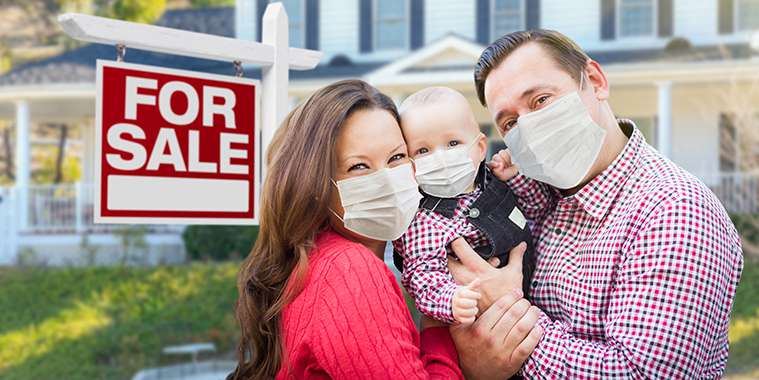Nearly a year after the first reported case of COVID-19, pharmaceutical giants started shipping their vaccines around the world.
A safe, effective and accessible vaccine would mean the end of lockdown policies and other safety restrictions. We spoke to our team of economists to see how they think this news could impact the economy and housing markets across Canada.
How will the economy, in general, be impacted by a vaccine?
A vaccine will allow individuals to go out and interact with others without the fear of getting sick. CREA Economist Doug Blissett theorizes many Canadians may be eager to make up for lost travel plans or spend more time out at restaurants and bars with friends.
“But for some industries it may depend on what habits people have formed during the pandemic and what they hold on to.” says Blissett. “There are many sectors that have out-performed during the lockdown phase including household appliances, sports equipment and vehicle sales. These retailers might not see as much demand once a vaccine becomes widely available. However, clothing retailers and manufacturers are anxiously anticipating people needing to wear more than pajama pants to work.”
Meanwhile, CREA Economist Ryan Biln notes it will take time for the economy to fully recover and recoup losses seen during the pandemic.
“It’s been hardest on small businesses and on workers in the services sector,” he said.
What could a vaccine mean for interest rates?
In October 2020, the Bank of Canada said it expected interest rates to remain low for at least the next three years. A vaccine will not change this overnight, our economists say.
“[A vaccine] is positive economic news for sure, although we’re a very long way away from a return to normalcy and it’ll take some time for people to start feeling confident again. It’s more than likely households will want to hold on to more precautionary savings than they would have prior to the pandemic. This means interest rates will remain low compared with historical levels for a long time yet,” said Blissett.
It’s possible interest rates will slowly rise if inoculation is successful, said Biln.
“If the vaccine is rolled out properly and is successful throughout the next two years, the government can focus all of its efforts on policies that promote economic growth and getting Canadians back to work,” says Biln. “The Bank of Canada has indicated if economic conditions do improve, interest rates could start rising in 2023.”
How will a vaccine impact migration trends?
A successful vaccine will allow people to move around a lot easer than what is currently possible, says Biln.
“Once our borders open up again, expect to see a ramp up in international immigration as Canada is an attractive country and is dealing with the pandemic a lot better than some other nations across the globe,” he said.
Blissett echoed this sentiment while adding, “the past four years have seen record levels of immigration and Canada will continue to be a desirable place to live, if not even more so than before the pandemic.”
In general, the pandemic has allowed people to rethink where they want to live, said CREA’s Senior Economist Shaun Cathcart.
“If going forward our lives are permanently changed in some of the ways that are currently being floated, and that changes the calculus of where and how we want to live, then we could easily see a period where a lot of people who thought they’d be living where they were heading into this year until they were old and grey, decide it’s time to move. Call it a big shake-up or churn that otherwise would not have happened,” he said. “That could mean a lot more activity in resale markets as people move around.”
How will a successful vaccine impact housing affordability?
There are two aspects of affordability in most markets: the amount of money the buyer makes and the availability of homes, Blissett explained.
“The opening up of business will certainly improve the incomes for many workers in service sector jobs which will help them afford to get into the market,” said Blissett. “While the supply side of homes is likely to increase as construction jobs are able to get back to normal. The resale market may see a boost in supply as those people who held back from listing their properties during the pandemic feel more comfortable doing so. There is certainly lots of demand to get into those homes.”
How much time do you think it would take to see any impact on the housing market?
Our team of economists agreed with the current tight market conditions, the impact on the housing market will be immediately apparent.
“The market is already historically tight in many markets across the country, but we could see more listings hit the market after a vaccine is successfully introduced if more home owners feel comfortable having buyers walk through and view their homes,” said Biln.
Meanwhile, Blissett said, “As with the implementation of lockdowns, I don’t expect there to be much of a lag in terms of a reaction from the housing market, whether it’s people snapping up a condo downtown while it’s available, or getting their income back and being able to qualify for the home they’ve been looking at. The housing market is very tightly integrated with the overall economy.”
Cathcart noted, while 2020 has seen record-breaking housing numbers, we can expect to see even more movement as people see more stability in their employment and the economy as a whole.
“People don’t tend to uproot their lives and families on a whim or based on circumstances they suspect are likely to be temporary, or during times of high uncertainty about the future. It will be the extent to which the new normal differs from the old normal that determines how people permanently reorganize their lives in the years ahead,” he said.
“A two-hour commute is a lot if you do it every day, but not so much if you do it once a week. The issue is we’re still in the middle of this. I think the bulk of the re-organization of things will only come once we have some certainty about how things will work once this COVID-19 experience is officially in the rear-view mirror.”
Based off vaccine distribution, do you foresee markets being impacted differently? Based off proximity, population, etc.
“The ability to work more from home and reduced benefits from crowded, connected city life have made single detached homes located a bit further out of the downtown core, seem more appealing. However, what habits people hold on to will determine if they want to give up some of that space in exchange for being closer to the action and opportunities or if they are enjoying gardening and that full basement more than they expected,” said Blissett.
The condo market, in contrast, has underperformed relative to ground-level properties this year. Cathcart believes a vaccine will put an end to this trend.
“I think it’s a pretty safe bet that an effective vaccine that ends this virus we’re all so scared of, that allows for the reopening of bars and restaurants and theatres and everything else, will result in a significant reversal of this trend. The thing that may prove to be more “sticky” in the post-pandemic world will be the necessity to be as close to one’s place of work if the work from home trend hangs around,” he said, noting the if a hybrid or more flexible work arrangement is the new norm, it could have major implications for where home is.
Cathcart says any way you look at it, a vaccine will mean more opportunities to buy and sell homes.
It’s going to take a while to get some hard numbers on the long-term impact of the pandemic. Time will tell if a vaccine will eventually bring behaviours closer to what they were pre-COVID-19.
— Realtor.ca



